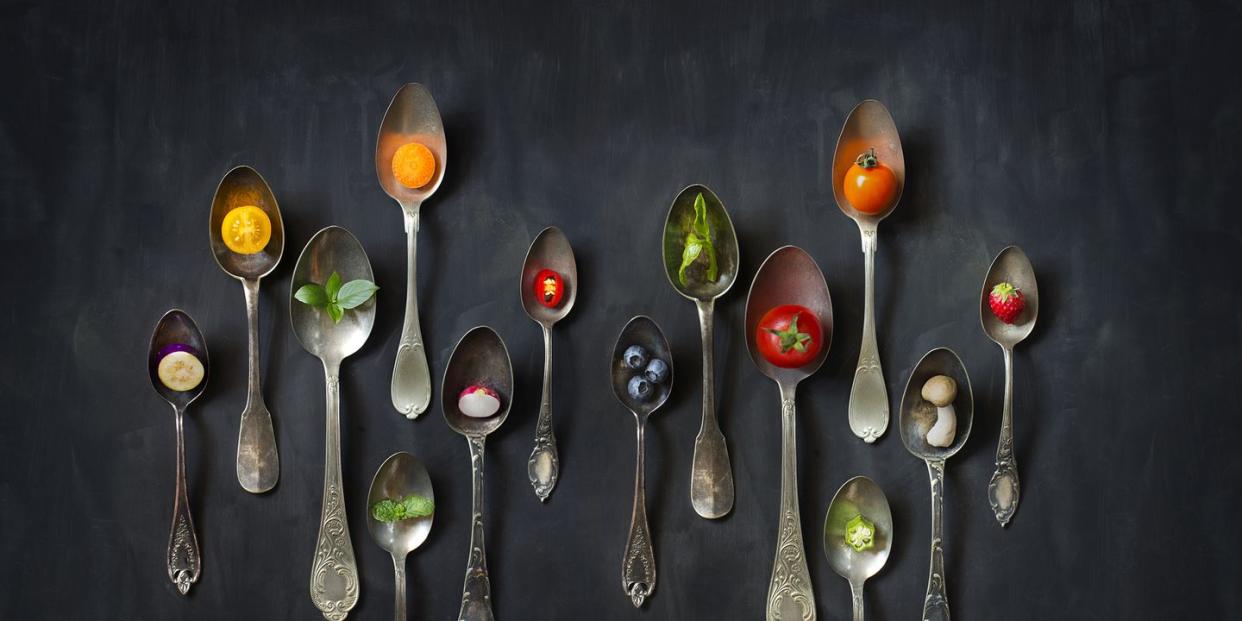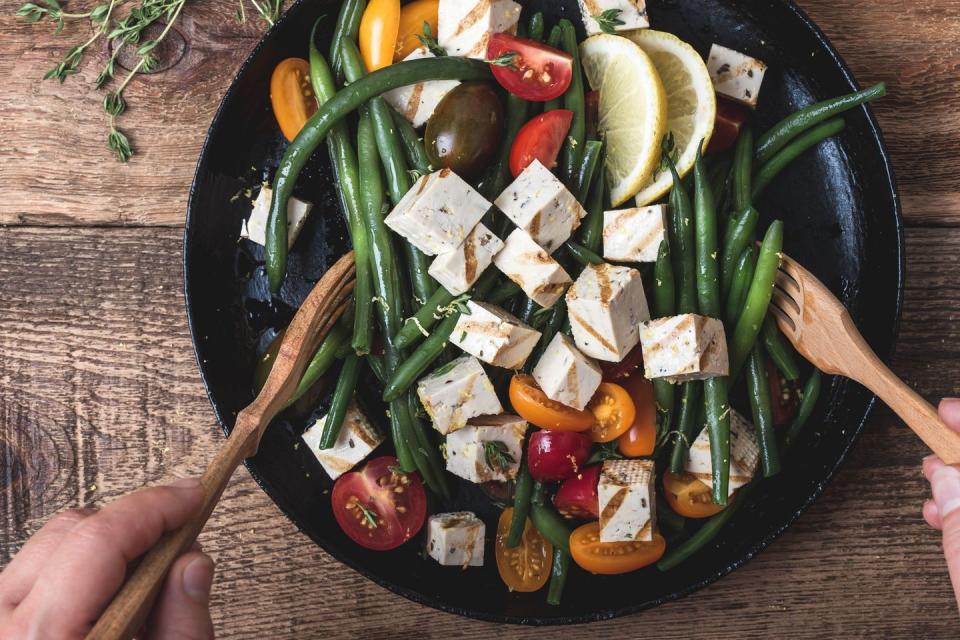8 best vegan supplements and vitamins

Following a plant-based diet is one of the healthiest lifestyle choices you can make, but since s0me nutrients are harder to come by (or absent entirely) in plant form, finding the best vegan supplements, and knowing which are the best vegan vitamins to take, requires a little extra effort.
We asked registered dietician Roxane Bakker, in-house dietician at Vitl.com; and Konstantin Karuzin, medical director at personalised supplement service Bioniq, to talk us through the best vegan supplements and vitamins, explain their function in the body, and advise the recommended daily dosage for a vegan diet:
8 of the best vegan supplements
Following a vegan diet means that you’re not consuming any animal products whatsoever, including meat, fish, eggs, and dairy products. As well as missing out on certain dietary vitamins that are only available through animal sources – vitamin B12, for example – different vitamins vary in terms of ‘bioavailability’, which refers to how much of that particular vitamin is available for your body to use.
‘Bioavailability can be defined as the proportion of the nutrient that is absorbed from the diet – or supplements – and used for normal body functions,’ Bakker explains. ‘Minerals and other nutrients exist in different chemical forms in your food, and this can influence their bioavailability.’
A good example of this is iron. ‘Vegan diets contain mainly ‘non-heme’ sources of iron, which is less efficiently absorbed than ‘heme’ iron of animal origin,’ she says. This is why adding vitamin supplements to your heath routine is a must when following a vegan diet.
‘If this isn’t managed properly to ensure a balanced diet, you may find yourself lacking in certain essential nutrients,’ Bakker continues. ‘Supplementation is an easy and convenient way to make sure that you are meeting all your micronutrient requirements.’
1. Vitamin B12
Vitamin B12 is important for many essential processes in the body, including ‘DNA synthesis, red blood cell production and energy metabolism,’ says Bakker. It’s also crucial for your nervous system and can lead to anaemia, infertility and even bone or heart disease.
Despite being so crucial for health, deficiency is common. It can be easily masked by a high intake of folic acid or folate, Bakker adds. Those following a vegan diet can find vitamin B12 in fortified products such as breakfast cereals, plant milks, soya products, and nutritional yeast.
A word of warning – vitamin B12 is light-sensitive, and may degrade if stored in clear containers. It’s best absorbed when taken in small doses, and the daily recommended intake is 2.4 mcg per day for adults.
2. Calcium
This mineral is essential for healthy bones and teeth, says Karuzin. Calcium also bolsters your immune system and nervous system – nerves use calcium to carry messages between your brain and every part of your body. ‘If you don't eat dairy products, you may be deficient in calcium,’ he says. ‘It is difficult to get adequate calcium from [other] foods.’
Sources of well-absorbed calcium for vegans include leafy green vegetables – such as bok choy, broccoli, collards, Chinese cabbage, kale, mustard greens, and okra – tofu, tempeh, tahini, almonds, and black beans. The daily recommendation for calcium is set at 1,000 mg per day for most adults, increasing to 1,500 mg for those over 50.
3. Vitamin D
While the majority of our vitamin D is synthesised in the skin when it’s exposed to the sun, the only significant natural dietary sources of this vitamin are oily fish – such as salmon, herring, and sardines – as well as red meat, egg yolks, and liver.
Vitamin D is especially important for vegans – and anyone following a dairy-free diet – because it’s essential for calcium absorption. Vegan sources include fortified foods such as margarine, breakfast cereals and plant-based milks. When using a supplement, take 10mcg per day.
4. Omega-3 fatty acids
Your body needs three different omega-3 fatty acids. The first is alpha-linolenic acid (ALA), which is known as an essential omega-3 fatty acid, because you can only get it from your diet. There’s also eicosapentaenoic acid (EPA) and docosahexaenoic acid (DHA), which are mostly found in animal products like fatty fish and fish oil, or made by your body from ALA.
In a vegan diet, ‘ALA is only obtained from plants, and the conversion of this fatty acid into EPA and DHA – which are essential components of your cells’ membranes – is very inefficient,’ Bakker says. This leads to an imbalance of fatty acids and deficiency in EPA and DHA, which are very important for brain and body health – from assisting with brain development to reducing your risk of breast cancer, depression and more.
Vegans – and anyone who doesn’t regularly eat fatty, oily fish – can reach the daily recommendation of 250–500 mg per day by supplementing with algal oil.

5. Iron
Iron is an important component of your red blood cells, as it transports oxygen around the body, says Bakker. Consuming too little iron can lead to anaemia, decrease your immune function, and result in dry and damaged skin and hair – or even hair loss.
‘A deficiency in this nutrient presents as fatigue, and vegans especially need to ensure they are eating enough iron-rich foods,’ Bakker says. ‘Vegan diets often have higher amounts of phytates – a naturally occurring compound found in all plant foods like beans, grains, nuts, and seeds – which can inhibit the absorption of this mineral.’
As Bakker explained, heme iron is only available from animal products, whereas non-heme iron is found in plants. Because heme iron is more easily absorbed, people who follow a vegan diet are often advised to aim for 1.8 times the usual daily recommendation, which is 8 mg per day for adult men and post-menopausal women; 18 mg per day for adult women.
Iron-rich vegan foods include cruciferous vegetables, beans, peas, dried fruit, nuts, and seeds, and fortified foods, such as cereals, breads, and plant-based milks.To increase absorption, avoid drinking caffeinated drinks with meals, and pair iron-rich foods with a source of vitamin C. You could also use cast-iron pots and pans to cook with.
6. Zinc
Zinc is essential for metabolism, the immune system and cell repair, says Karuzin. ‘Contained mainly in animal products, and with the same absorption mechanism as iron, zinc from plant foods is poorly absorbed,’ he says. Adults need around 10 mg per day – equivalent to around two oysters.
Vegans tend to consume lower amounts of zinc than their meat-eating counterparts, adds Bakker. ‘The effect of a higher phytate consumption – as found with vegan diets – on the bioavailability of zinc is a cause for concern,’ she says. For this reason, vegans are encouraged to consume 1.5 times the recommended amount each day.
Whole grains, sprouted breads, tofu, legumes, nuts and seeds are all suitable plant-based sources of zinc. Soaking legumes, nuts and seeds and seeds overnight boosts absorption, as does eating fermented foods such as miso, kimchi and tempeh.
7. Iodine
Iodine plays an important role in the functioning of the thyroid gland and metabolism, says Karuzin. Iodine comes mostly from food such as iodised salt, seaweed, seafood and dairy products. The latter is the main source of iodine for most people, and comes from iodine supplements in cattle feed and iodine-containing disinfectant.
In plants, the iodine levels depend on the the iodine content of the soil they were grown in. Adults are recommended to have 150 mcg of iodine per day. If you don’t use iodised salt or regularly eat seaweed, you should consider taking an iodine supplement.
8. Protein
Protein is described as the building block of life for a reason. It’s responsible for making enzymes, hormones, and other body chemicals and also plays a vital role in building bones, muscles, cartilage, skin, and blood. While protein seems to be packed into everything these days, from workout shakes to energy bars, plant protein differs from animal protein, which is known as ‘complete’ protein, since it contains all nine amino acids your body needs.
Certain plant proteins, such as quinoa, tofu, and hemp seeds, are complete proteins, but some are ‘incomplete’ i.e. missing some amino acids. This means you need to combine different sources plant proteins throughout the day to make up the complete range of amino acids needed by your body and fill in the gaps. As long as you’re eating a healthy, balanced diet with a variety of plant protein sources, this shouldn’t be a problem.
The bottom line
Following a vegan diet focused on fruit, vegetables, pulses, beans, nuts, seeds and unrefined whole grains can have a significant and positive impact on your health. But without proper planning, you’ll miss out on essential nutrients – that’s where vegan supplements come in.
‘A well-chosen diet and proper portioning can meet your nutritional needs,’ says Karuzin. ‘However, certain nutrient requirements are difficult to achieve through diet and food alone. This is especially true for vitamin D, omega-3, iron and vitamin B12. However, for a complete picture, it is necessary to perform tests and consult a doctor.’
Last updated: 23-07-2020
You Might Also Like

 Yahoo News
Yahoo News 
